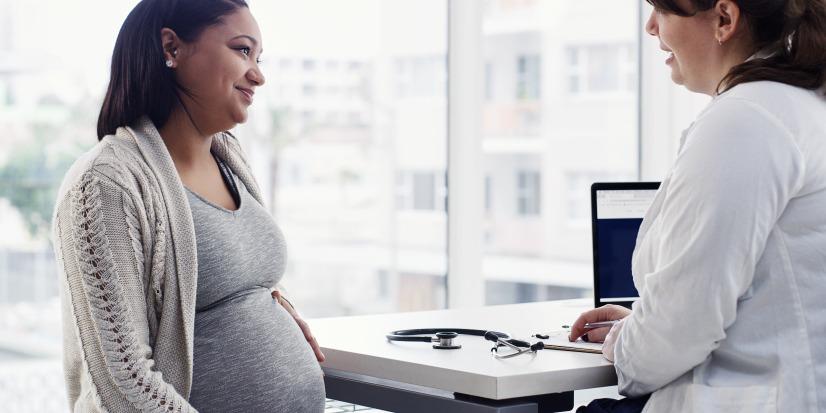Updated: March 10, 2022
Across the United States, rates of pregnant women with high blood pressure are increasing. The CDC estimates that 1 in every 12 to 17 pregnancies among women ages 20 to 44 are affected by this condition. In pregnancy, blood pressure must be elevated to at least 140/90 or higher to meet the criteria for hypertension.
How does Hypertension Affect Pregnancy?
Hypertension in pregnancy can lead to complications for both mother and baby. In fact, high blood pressure and its complications (preeclampsia, eclampsia, placental abruption) are some of the leading causes of maternal and fetal death in the United States. For the baby, persistent high blood pressure results in poor blood flow to the placenta, leading to complications that include low birth weight and preterm delivery (birth before 37 weeks of pregnancy).
Types of Hypertension
Chronic Hypertension
Chronic hypertension is defined by high blood pressure that develops prior to pregnancy or prior to 20 weeks of pregnancy.
Gestational Hypertension
Hypertension occurs only during pregnancy and usually goes away after giving birth. This type of high blood pressure is often diagnosed after 20 weeks of gestation.
Preeclampsia and Eclampsia
Preeclampsia is the sudden development of high blood pressure in a pregnant woman who previously had normal blood pressure after 20 weeks of pregnancy. This condition is characterized by protein in the urine and is usually accompanied by other symptoms such as headache or vision changes. However, some women have no symptoms of preeclampsia, and women with chronic or gestational hypertension can also develop this condition.
In rare instances, this condition can progress to the development of seizures, which is a life-threatening emergency. Preeclampsia with the onset of seizures is known as eclampsia.

Common Symptoms of Preeclampsia:
Persistent headache that does not go away
Vision changes (blurry vision, seeing spots)
Pain in the upper abdomen
Swelling of the arms, legs, or face
Nausea or vomiting
Shortness of breath
Risk Factors for Preeclampsia:
History of preeclampsia in a previous pregnancy
Chronic hypertension
Diabetes (Type 1 or Type 2)
Advanced maternal age (35 and older)
First pregnancy
Obesity
Family history of preeclampsia
IVF pregnancy
Pregnancy with multiple babies (twins, triplets, etc)
Some autoimmune disorders (lupus, antiphospholipid syndrome)
Preventing High Blood Pressure During Pregnancy
Prenatal Visits
With or without hypertension in pregnancy, prenatal care requires frequent visits with an obstetrics provider. These appointments are important to closely monitor both mother and baby’s health. Weight and blood pressure are checked at every visit. Fetal heart rate monitoring and measurements are done to evaluate the baby’s well-being and growth.
Postpartum
While having a new baby can be both an enjoyable and exhausting time in your life, keeping an eye on your health shouldn’t stop after delivery. In rare cases, preeclampsia can occur up to 6 weeks after delivery, which is known as postpartum preeclampsia. If at any point you aren’t feeling well after the delivery of your baby, talk to your doctor about your symptoms. Don’t just assume it’s normal, especially if you had high blood pressure during pregnancy.
Planning Ahead
While it is impossible to predict which women will develop preeclampsia and which will not, a preconception visit is always a good way to help identify women who will be at higher risk. For example, some women with certain risk factors (such as preeclampsia in a prior pregnancy) may benefit from low-dose aspirin therapy during their next pregnancy. However, other chronic medical conditions may be managed differently during pregnancy, so it can also be helpful to meet with your doctor prior to conception to make sure your current medications will be safe to continue during pregnancy.

Though there is not a way to prevent some types of hypertensions in pregnancy, chronic hypertension is a preventable condition in most cases. Taking care of yourself will increase the odds of a healthy pregnancy. Ways to do that include staying active, eating a healthy diet, and keeping your prenatal appointments.
If you are concerned about your risk for developing high blood pressure in pregnancy or elevated blood pressure in general, speak with your healthcare provider. You’ll be able to discuss specific symptoms to look out for and make a plan together for what you should do if they develop. They will become your partner in the journey to parenthood and make recommendations and adjustments to your lifestyle along the way based on your individual needs. Find a provider that’s right for you.







